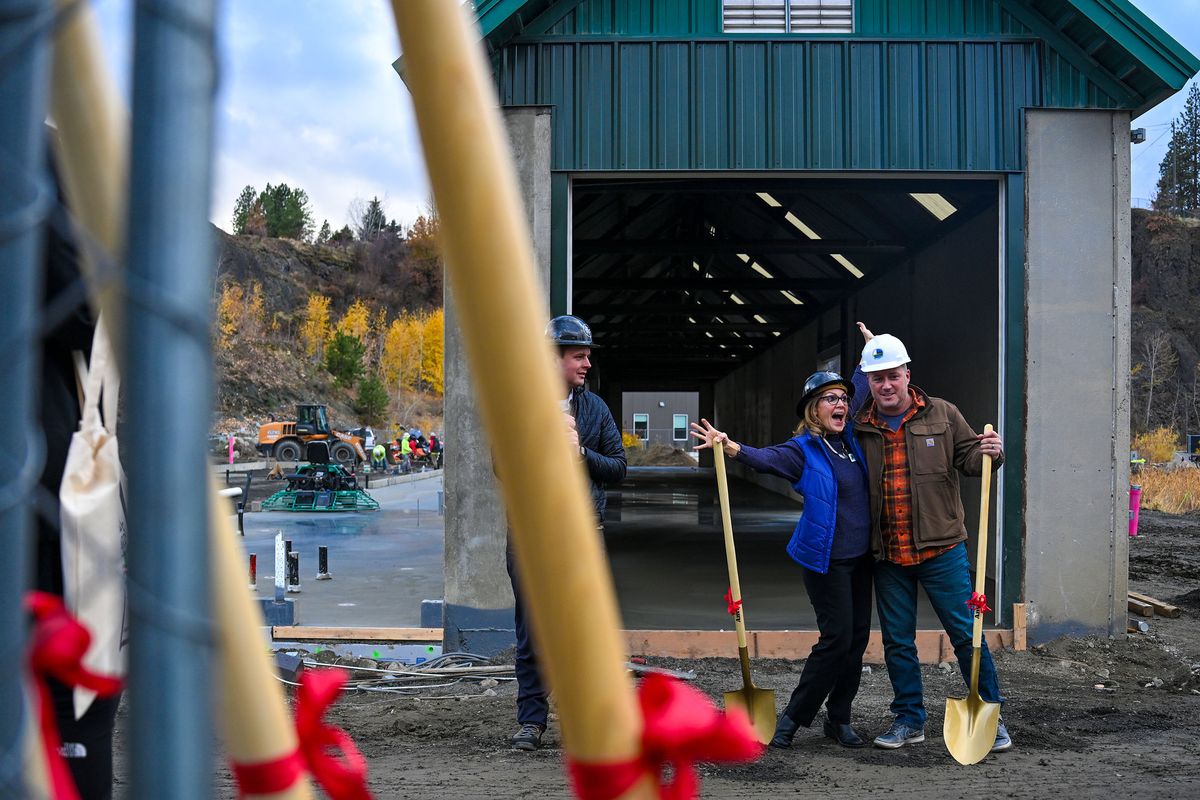Next phase begins for a Spokane year-round farmers market to open this spring

Over construction noises Tuesday, project leaders dug in for the building phase of a Spokane year-round farmers market set to open by spring.
Called the Scale House Market at the Quarry, the $4.4 million project is part renovation and part addition at a former asphalt “scale house” once meant for measuring truck loads.
The Spokane Conservation District, with offices on the same 50-acre site, is leading the project at 4422 E. Eighth Ave., near Havana Street. The market is expected to draw nearly 250,000 people a year with indoor-outdoor vendors, a commercial kitchen, food truck incubator, classes and events, operating all year long instead of the traditional spring-to-fall farmers market model.
“A lot of people know us based on what the former life was as the rock quarry,” district director Vicki Carter said.
Halme Cascade General Contracting began some construction in September.
“We’re less than five minutes off the freeway, and Eighth Avenue is becoming a major arterial. Because we’ll be so heavily event-driven, people will come here with a purpose. We have a large customer base to start. With our annual tree sale – that alone – we’re up to nearly 2,000 customers who find us.”
The new site will feature a blend of seasonal open-air markets, an indoor mercantile year-round and community events. The site is located in a U.S. Department of Agriculture-designated food desert without easy access to nearby fresh foods, the district said.
Residents can take classes on cooking, food preservation and how to avoid food waste. Vendors also will offer related products such as seeds and flowers.
After receiving public and private funds, a capital campaign is within $1 million of its goal, Carter said. In 2023 and 2024, the Legislature approved more than $1 million toward the project. Carter said a newly formed partnership with BECU accelerated development to open on time. The credit union has pledged about $500,000 across four years, said Bryan MacDonald, BECU chief impact officer.
“This is the role model that a lot of cooperatives strive for,” MacDonald said, regarding the aim to reduce food insecurity, bring quality foods and help small businesses.
Even in the winter, the farmers market vendors expect to have plenty for people to buy, Carter said. That’s because the center’s refrigerated spaces, kitchen access and dry food storage add up to a lot when nothing green is outside.
“With so many of our products, if they have proper food storage, we can sell them year-round, just like with apples,” Carter said.
Vendors also will offer related products, such as seeds and flowers.
“That is some of the beauty of this project – along with our commercial kitchen, we will have refrigeration and freezer space in this build-out,” Carter said. “That will allow our producers to have longer seasons. We will have some shelf-stable items; there will be dry goods available year-round such as beans and herbs, spices, pasta, breads.”
Vendors have started applying for spaces this month. The first market season is expected to begin in May , likely with sales scheduled for three days a week at first, said Brittany Tyler, owner of Four Roots, a company that will manage the market.
“Our goal right now is to have two evening markets a week and one weekend day,” Tyler said. It might start with a Saturday market.
Storage and preservation on-site also are aimed at reducing food waste at farmers market for any leftover produce that might get thrown out otherwise, she said. Customers can learn the same techniques.
“There will be a lot of the nutrition education, demonstration, classes – anything to do with food production, preparation, preservation – really bringing back skills that have been lost, and increasing people’s ability to use the nutritious food that they find at the market,” Tyler said.
The center is expected to take more than $320,000 in SNAP transactions, increasing food access for families facing food insecurity, Carter said. It also will have an incubator space for entrepreneurs and host educational programs for students in public and private schools.